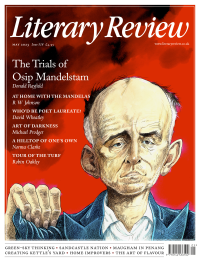Joel Arcanjo
Five Hundred Years of Solitude
Ghostlord
By Philip Womack
Little Island Books 264pp £8.99
When Meg and her mother leave the big city for a charming cottage in a sleepy village, Meg knows that she will have the whole summer to adjust to a quieter way of life. Then she starts hearing the voice of a child calling out to her for help. The cries, she learns, come from an obsidian mirror embedded in the forehead of a toy horse and belong to the ghost of a young boy who has been trapped all alone for centuries. The boy, Jankin, desperately needs help to break free and only Meg can find his prison.
An ability is awakening in Meg, one that means she can open dimensional doorways through our world and worlds unknown. And somewhere, in among the labyrinth of mystical corridors that she must learn to navigate, is the cell that holds Jankin captive. Soon, though, Meg begins to ask herself

Sign Up to our newsletter
Receive free articles, highlights from the archive, news, details of prizes, and much more.@Lit_Review
Follow Literary Review on Twitter
Twitter Feed
Under its longest-serving editor, Graydon Carter, Vanity Fair was that rare thing – a New York society magazine that published serious journalism.
@PeterPeteryork looks at what Carter got right.
Peter York - Deluxe Editions
Peter York: Deluxe Editions - When the Going Was Good: An Editor’s Adventures During the Last Golden Age of Magazines by Graydon Carter
literaryreview.co.uk
Henry James returned to America in 1904 with three objectives: to see his brother William, to deliver a series of lectures on Balzac, and to gather material for a pair of books about modern America.
Peter Rose follows James out west.
Peter Rose - The Restless Analyst
Peter Rose: The Restless Analyst - Henry James Comes Home: Rediscovering America in the Gilded Age by Peter Brooks...
literaryreview.co.uk
Vladimir Putin served his apprenticeship in the KGB toward the end of the Cold War, a period during which Western societies were infiltrated by so-called 'illegals'.
Piers Brendon examines how the culture of Soviet spycraft shaped his thinking.
Piers Brendon - Tinker, Tailor, Sleeper, Troll
Piers Brendon: Tinker, Tailor, Sleeper, Troll - The Illegals: Russia’s Most Audacious Spies and the Plot to Infiltrate the West by Shaun Walker
literaryreview.co.uk